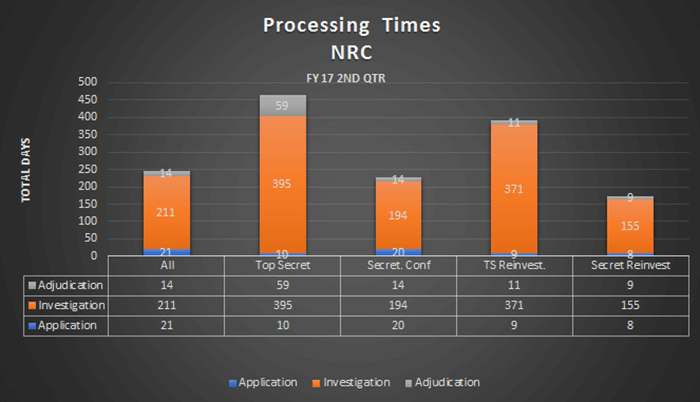Federal agencies are required to publish their clearance processing times. We’ve recently looked at processing times for the Department of Defense (DoD), which issues the vast majority of security clearances. We also looked at the Department of Energy (DoE). Both the DoD and DoE use the Office of Personnel Management (OPM) to perform investigations.
The chart below notes the processing times for the Nuclear Regulatory Commission’s Fiscal Year 2017 2nd Quarter by security clearance level for the three steps: application, investigation and adjudication, along with reinvestigations.

Data courtesy of National Background Investigations Bureau
The NRC numbers
If you expect to see anything different here from the other two agencies discussed in the previous two articles, stop looking; it is just more of the same. With the same goal as the DoD and DoE of 114 days total start-to-finish for an initial Top Secret, the review of the breakdown is the same:
- 14 days for the application
- 80 days for investigation
- 20 days for adjudication
… however, the processing time as of March 2017 for the fastest 90% of initial Top Secret applications was 464 days; Secret/Confidential requests had a goal of 74 days, while their actual processing took 228 days.
As far as number of adjudications processed during FY 17 2nd Quarter, the number are small in comparison with the other two agencies:
- 89 – Initial
- 10 – Top Secret
- 79 – Secret/Confidential
- 29 – Top Secret Reinvestigations
- 93 – Secret Reinvestigations
The NRC’s processed numbers are small because their agency is small. Having their own personnel security processing program, like the DoE, one would think it would be easy to manage security clearances for their personnel. But just like the other agencies, their background investigations must go through OPM, or more specifically now the National Background Investigation Bureau (NBIB).
The NBIB is a new branch in OPM created by the Obama administration tasked with taking over background investigations. But creating the new branch didn’t accomplish much if anything. In effect, it just transferred the monster to them. The NBIB inherited the 500,000 backlogged requests, thereby putting them behind the power curve before they even got up and running!
The effect of processing delays
With the NRC being such a small agency, holding up even a few background investigations could have a significant impact on essential operations – generating power and maintaining the security of the reactors.
But it could go deeper than this. Even issuing an interim clearance could have a devastating effect.
Remember that interims can be pulled if something in the person’s background would preclude that person from getting a full clearance.
Because the control systems of the reactors are not connected to the Internet, direct cybersecurity threats to any of the Nation’s 99 reactors would most likely come from within – possibly from an employee with an interim clearance who had not yet been fully cleared and got access to classified areas where damage could be done to a reactor before the full clearance is received; so, the full clearance process is critical to the NRC’s mission and ultimately safety of the Nation.
The only real solution for the NRC is ensure a new employee has a full clearance before the person is granted access to classified information or secure areas that could result in damage to a reactor.
As this series concludes, the overall solution to the clearance process times problem is to allow the NRC, DoE and other federal agencies having their own personnel security systems full control over their clearance process, including background investigations. Not only would this get more people involved in processing clearance applications, but it would reduce the backlog at the NBIB and the time it takes to get a full clearance.




